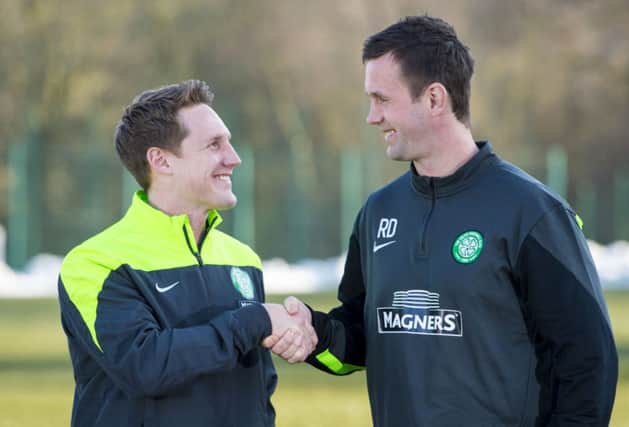Ronny Deila on Celtic’s positive January window


If, as many were convinced would happen, last month had ended with Commons sold to Bolton, Virgil van Dijk flogged for a sizeable wedge and no new arivals, then Deila would have appeared weak and little more than a puppet of chief executive Peter Lawwell.
FOLLOW US
SCOTSMAN TABLET AND MOBILE APPS
That Commons agreed an extension and the only changes to Deila’s playing pool came courtesy of the £2m invested in Dundee United duo Stuart Armstrong and Gary Mackay-Steven, pictured right, has had the effect of cementing his authority.
Advertisement
Hide AdAdvertisement
Hide AdIn a week in which Rangers’ acting manager Kenny McDowall had five must-play loanees forced on him and Alan Johnston effectively chucked it at Kilmarnock because he had a player sold without his knowledge, the developments have shown Deila as a genuine decision-maker at Celtic. The moves are sure to be gratifying to the Norwegian – maybe there was more to his dad dancing captured on a camera phone than his celebrations over last Sunday’s League Cup semi-final success against Rangers.
“I think I had good control all the time,” said Deila, who is in Italy today to watch Europa League opponents Inter play Palermo. “Of course, I have to thank Peter [Lawwell] because he listened to what I needed. I said all the time that I wanted to keep Kris and I didn’t want to lose anyone. I also said we had money to spend on new players. If that didn’t happen, it would have shown that I didn’t have power. That’s true.
“But I communicated and worked with Peter and the board. If a player was leaving, we would have had to agree on that. It might have been so much money that we couldn’t say no. But it’s never a situation where they tell me what is happening. We talk about things and then agree on it. We’ll always be as one. It never crossed my mind that things wouldn’t go the way I wanted it to.
“I was never worried about it. What worries you is if you can actually get the players in. Sometimes financially it’s too much. But in the end, we did it, which was good.
“I’ve never had conditions imposed on me [like those at Rangers and Kilmarnock]. I haven’t experienced those things and the power is important. When you choose a club it’s important that you know you can work with the people there. I had a very good feeling at once when I spoke to Peter and [major shareholder] Dermot Desmond before coming here.
“This is a very professional club and they want to improve all the time. I had the right feeling in my stomach and since then our working relationship has been good. We speak every day. We want the same things for Celtic and we have to do it the right way for the club. I always believed I would have this level of power at the club. I haven’t experienced anything else. But you have to earn that power for yourself.
“It’s important to say that I’m not here for my own CV. I’m here to create something at Celtic and develop the club.
“Maybe that’s a naïve and stupid thing to say as a manager because you know how hard this world can be. But I can live with that.
Advertisement
Hide AdAdvertisement
Hide Ad“When I leave Celtic I want to leave the club in a better place than it was before. If I can do that, I’ll have succeeded. If there’s a lot of trophies there as well, it would be fantastic.
“So working together with Peter is so important. We have to use our energy together, not to fight against each other, as we move forward. Of course, we’ll confront each other at times. But it’s all about communication. It’s the same as myself with the players. If I’m up here, they’re down there and maybe we’re not speaking to each other, I’ll be angry at them and they’ll be angry with me. But that will ruin the team. So they have to come to me and ask ‘why are you doing this’? And I have to do the same. That way, you grow together and you develop. It’s about leadership.”